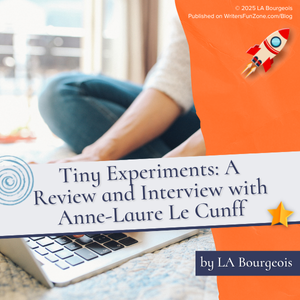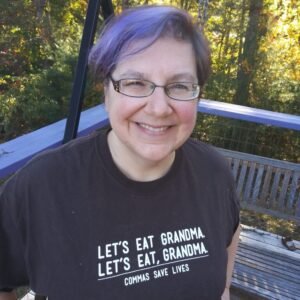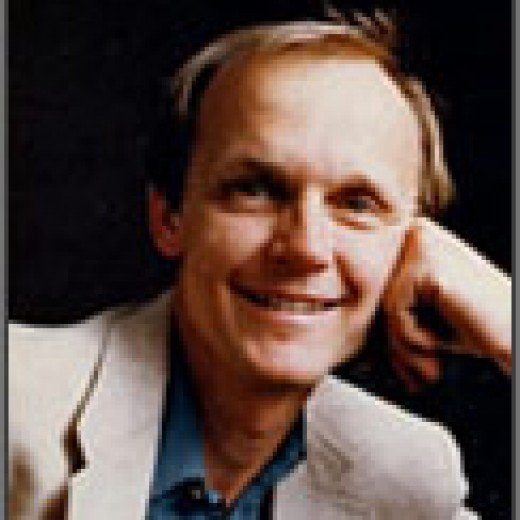Tiny Experiments: A Review and Interview with Anne-Laure Le Cunff by LA Bourgeois
 Let’s welcome back LA Bourgeois as she shares with us “Tiny Experiments: A Review and Interview with Anne-Laure Le Cunff.” Enjoy!
Let’s welcome back LA Bourgeois as she shares with us “Tiny Experiments: A Review and Interview with Anne-Laure Le Cunff.” Enjoy!
***
Books for Thriving Creatives in 2025
During 2025, we’re reading Books for Thriving Creatives, and LA Bourgeois reviews them for us! Chosen texts covered integrating humor into your writing, reframing your money mindset, choosing your life purpose, and the writing business. Have a suggestion for a book to read or want to go deeper? Join her at The Thriving Creative for bonus content!
Meet Anne-Laure Le Cunff: Author and Founder of Ness Labs
As a child, Anne-Laure Le Cunff, author of Tiny Experiments and founder of Ness Labs, dreamed of a life filled with curiosity and adventure.
“I wanted to be so many things: a paleontologist, a fantasy writer, a veterinarian, a politician,” she said. “I even imagined doing steeplechase.”
Tiny Experiments: What it is
That theme carries through Tiny Experiments as Le Cunff encourages the reader to set aside the idea of linear goals and instead focus on growth loops, creating experiments from our curiosities whose results can be tracked and used to form the next steps.
As she says, “We don’t go in circles; we grow in circles.”
Creating Your Pact With Small Stakes
Experiments begin with creating a pact, a simple phrase that states “I will [action] for [duration].”
By keeping the stakes small, a person frees themselves to learn more about their project and make progress toward a finish.
Le Cunff says, “It’s almost impossible to fail when you see everything as an experiment.”
Reframing Progress and Decisions
The evaluation process is as important as the pact itself.
Le Cunff reframes many of the usual tools to track progress as useless and suggests alternatives.
For example, she reveals the fallacy of the pros-and-cons list in a surprising way, saying, “Such lists can provide plausible-sounding but hollow reasons to pursue choices that do not reflect your authentic needs and desires.”
Instead, she recommends practicing decision framing, a technique that expands your view to include both external information and internal instincts to inform the final choice.
As an example, in deciding to write your next story, you would consider not just the external possibilities of saleability and technique improvement, but also the pleasure of writing a story that speaks to your heart.
Practical Tools for Result Tracking
This book describes a process that is easy to follow with tools that make your experiments repeatable.
For instance, during your experiments, she encourages you to take “Field Notes,” quick notations of reactions or ideas, to track the results of the current project.
Outcome is Not Important: Focus on Action
And the best part is that your focus remains on your actions instead of outside metrics to evaluate, ie. choose to say “I will write for fifteen minutes every day-ish” rather than “I will publish my book this year.”
This one change releases you from the tyranny of external “success.” Rather, every completed tiny experiment is a closed loop, a project that you can point to and say, “Finished! Success!”
As Le Cunff says, “Success is the lifelong experiment of discovering what makes you feel most alive.”
By following the techniques and tools described in Tiny Experiments, you may find yourself surprised at exactly what that thing that makes you feel the most alive turns out to be.
A Conversation with Anne-Laure Le Cunff
Le Cunff’s curiosity and playfulness shone through every interaction I had with her.
Enjoy our short interview where she shared her inspiration for Tiny Experiments, the most effective tool in the book, and what being a thriving creative means to her.
What specific event prompted you to begin Ness Labs?
I hit a point in my career where I felt completely lost. So I went back to the drawing board and asked myself: What am I genuinely curious about? I had always been fascinated by the brain and how we think, feel, and experience the world, so I decided to retrain as a neuroscientist.
To make sense of what I was learning, I started a weekly newsletter. That newsletter became the seed that grew into Ness Labs: a learning community, a series of courses, and a book.
How did you decide to focus on tiny experiments for this book?
As I reflected on all the research, writing, and teaching I’d done, I noticed a unifying thread: the value of trying things out and learning from them.
The idea of experimentation kept surfacing.
Tiny experiments take the pressure off while encouraging sense-making.
That’s how the concept emerged as the heart of the book: a more liberating approach to ambition and personal growth.
Many of my readers struggle with uncertainty. What do you consider the magic of the liminal space?
Liminal spaces are deeply uncomfortable, so we normally want out as fast as possible.
But they’re also where the most profound growth can happen. If we can resist the urge to escape and instead stay with the uncertainty, we open ourselves to transformation.
These in-between moments, though unclear, can become powerful turning points if we let them.
Which tool from Tiny Experiments do you consider the most powerful, and why?
The most powerful tool is the Plus Minus Next review.
It’s simple, but transformative. You look at what worked (+), what didn’t (–), and what you want to try next (→).
It helps you celebrate wins, face failures with self-compassion, and maintain momentum, creating ongoing cycles of learning and iteration, which I call growth loops.
How do you define a Thriving Creative?
Someone who’s always willing to experiment, learn from each trial, and iterate.
Not with the certainty of knowing what success will look like, but with the confidence that they’ll figure out their version of success.
Grab a copy of Tiny Experiments: How to Live Freely in a Goal-Obsessed World by Anne-Laure Le Cunff at your favorite indie bookshop, library, or online.
Our next Book for Thriving Creatives is perfect for the height of the summer heat! How to Do Nothing: Resisting the Attention Economy by Jenny Odell encourages and teaches us how to reframe our lives to drop out of the cycle of 24/7 productivity and the trap of addictive technology designed to obtain and sell our attention. Join me for what I hope is a freeling meditation on our real value in this world. You can pick up this book online, at your favorite bookstore or at the library.
***
ABOUT LA BOURGEOIS
 LA (as in tra-la-la) Bourgeois is a Kaizen-Muse Certified Creativity Coach and author who helps clients embrace the joy of their creative work and thrive while doing it.
LA (as in tra-la-la) Bourgeois is a Kaizen-Muse Certified Creativity Coach and author who helps clients embrace the joy of their creative work and thrive while doing it.
Get more of her creativity ideas and techniques by subscribing to her newsletter at https://subscribepage.io/unlockyourcreativity.







I’ve been doing this too long to believe in the “Outcome is not important” advice. I understand where it comes from (and I believe something slightly softer — outcome arrives after you’ve taken a lot of aligned action, so measure and take pride in the aligned action on your way to the “big” outcome). Writing one scene in your novel, or creating a really great outline for your non-fiction are mini-outcomes that should be celebrated.
Hi Kelly – Sorry I missed this comment until now! I agree with you, that headline definitely simplified the following paragraph quite a lot. After all, Anne Laure analyzes each outcome to see what worked, what didn’t work, and what can be improved on the next iteration.
As you explain your process, I think you might like Tiny Experiments. Maybe check it out from the library and see what you think.
Personally, I usually will counsel people to not select an outcome they have little control over like “I will make XX dollars” or “I will get XX subscribers.” Rather, I encourage them to select an outcome that is dependent upon their actions and therefore more likely to be under their control like “I will work on my novel for fifteen minutes every day-ish.” Within my own coaching process, I want people to find success so they are more likely to return to the work.